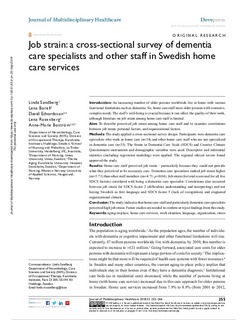| dc.contributor.author | Sandberg, Linda | |
| dc.contributor.author | Borell, Lena | |
| dc.contributor.author | Edvardsson, David | |
| dc.contributor.author | Rosenberg, Lena | |
| dc.contributor.author | Boström, Anne-Marie | |
| dc.coverage.spatial | Sweden | nb_NO |
| dc.date.accessioned | 2019-02-19T10:26:38Z | |
| dc.date.available | 2019-02-19T10:26:38Z | |
| dc.date.created | 2018-09-17T10:51:59Z | |
| dc.date.issued | 2018 | |
| dc.identifier.citation | Sandberg, L., Borell, L., Edvardsson, D., Rosenberg, L., & Boström, A.-M. (2018). Job strain: a cross-sectional survey of dementia care specialists and other staff in Swedish home care services. Journal of Multidisciplinary Healthcare, Volume 11, 255-266. | nb_NO |
| dc.identifier.issn | 1178-2390 | |
| dc.identifier.uri | http://hdl.handle.net/11250/2586180 | |
| dc.description.abstract | Introduction: An increasing number of older persons worldwide live at home with various functional limitations such as dementia. So, home care staff meet older persons with extensive, complex needs. The staff’s well-being is crucial because it can affect the quality of their work, although literature on job strain among home care staff is limited.
Aim: To describe perceived job strain among home care staff and to examine correlations between job strain, personal factors, and organizational factors.
Methods: The study applied a cross-sectional survey design. Participants were dementia care specialists who work in home care (n=34) and other home care staff who are not specialized in dementia care (n=35). The Strain in Dementia Care Scale (SDCS) and Creative Climate Questionnaire instruments and demographic variables were used. Descriptive and inferential statistics (including regression modeling) were applied. The regional ethical review board approved the study.
Results: Home care staff perceived job strain – particularly because they could not provide what they perceived to be necessary care. Dementia care specialists ranked job strain higher (m=5.71) than other staff members (m=4.71; p=0.04). Job strain (for total score and for all five SDCS factors) correlated with being a dementia care specialist. Correlations also occurred between job strain for SDCS factor 2 (difficulties understanding and interpreting) and not having Swedish as first language and SDCS factor 5 (lack of recognition) and stagnated organizational climate.
Conclusion: The study indicates that home care staff and particularly dementia care specialists perceived high job strain. Future studies are needed to confirm or reject findings from this study. | nb_NO |
| dc.language.iso | eng | nb_NO |
| dc.rights | Navngivelse-Ikkekommersiell 4.0 Internasjonal | * |
| dc.rights.uri | http://creativecommons.org/licenses/by-nc/4.0/deed.no | * |
| dc.subject | aging-in-place | nb_NO |
| dc.subject | home care services | nb_NO |
| dc.subject | work situation | nb_NO |
| dc.subject | language | nb_NO |
| dc.subject | organization | nb_NO |
| dc.subject | stress | nb_NO |
| dc.title | Job strain: A cross-sectional survey of dementia care specialists and other staff in Swedish home care services | nb_NO |
| dc.type | Journal article | nb_NO |
| dc.type | Peer reviewed | nb_NO |
| dc.description.version | publishedVersion | nb_NO |
| dc.rights.holder | © 2018 Sandberg et al. | nb_NO |
| dc.subject.nsi | VDP::Medisinske Fag: 700::Helsefag: 800 | nb_NO |
| dc.source.pagenumber | 255-266 | nb_NO |
| dc.source.volume | 11 | nb_NO |
| dc.source.journal | Journal of Multidisciplinary Healthcare | nb_NO |
| dc.identifier.doi | 10.2147/JMDH.S155467 | |
| dc.identifier.cristin | 1610052 | |
| cristin.unitcode | 203,6,3,0 | |
| cristin.unitname | Avdeling for helsefag - Stord/Haugesund | |
| cristin.ispublished | true | |
| cristin.fulltext | original | |
| cristin.qualitycode | 1 | |

